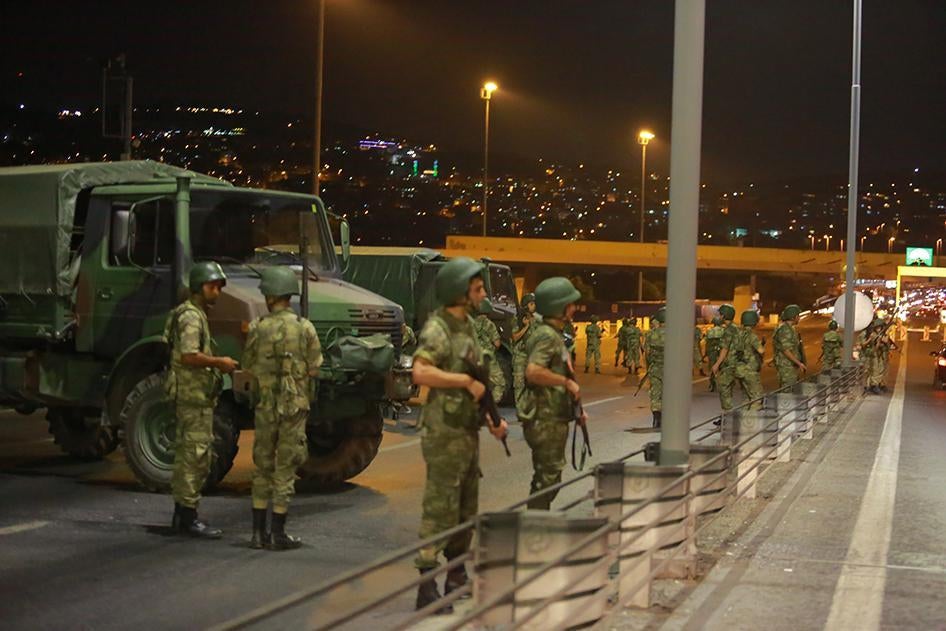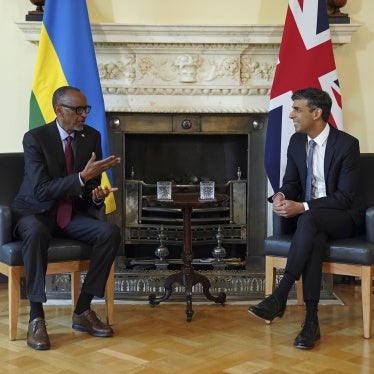(Berlin) – The response of the Turkish government to an attempted coup will be a critical test of its commitment to defend democratic principles and human rights, including media freedom and respect for the rule of law.
By July 18, 2016, authorities had announced more than 7,500 arrests, including 755 judges and prosecutors, and the suspension of thousands of judges, prosecutors, and police officers. Twenty news websites have been shut down.
“While the government has the complete right to hold to account those involved in the coup, the speed and scale of the arrests, including of top judges, suggests a purge rather than a process based on any evidence,” said Hugh Williamson, Europe and Central Asia director at Human Rights Watch. “Turkey’s citizens who took to the streets to defend democracy deserve a response that upholds the rule of law and protects media freedom.”
The attempted coup d’état in Turkey by elements in various parts of the military on July 15-16 led to at least 200 civilian and police deaths as they tried to resist soldiers, scenes of tanks in the Istanbul and Ankara streets, and fighter jets bombing the Ankara Parliament. Mass popular opposition to military intervention in today’s Turkey and the unity of all political parties in condemning the coup attempt are widely regarded as having played a critical role in the coup’s failure.
President Recep Tayyip Erdoğan and his ruling Justice and Development Party should honor the public support for democracy by adhering to democratic standards and upholding the rule of law and human rights rather than undermining them.
On July 18, Prime Minister Binali Yıldırım announced the detention of 7,543 people, 6,038 of them soldiers allegedly involved in the coup attempt and also 755 judges and prosecutors. With the reported suspension of an additional 2,500 judges and prosecutors over two days about one-fifth of the members of Turkey’s justice system have been suspended or detained. This has plunged the judiciary into yet more crisis after repeated purges over the past two years. There has been no explanation of what role the judges and prosecutors might have had in a military coup attempt. On July 18, the interior minister reported the suspension of 7,877 police officers and bureaucrats, among them 30 governors.
At the request of the prime minister’s office, about 20 news websites critical of the government have been closed down. This consolidates on the ongoing crackdown on the media, which has intensified over the past 10 months. Rumors are circulating on social media sites close to the government that the government plans to detain a number of well-known journalists and close down further media outlets, though it is unclear whether the reports are accurate.
Following the failed coup, some politicians have advocated reintroducing the death penalty, which Turkey abolished in 2004, after joining a binding Council of Europe treaty that prohibits it. The European Union made clear that any reintroduction of the death penalty would end Turkey’s chances of joining the EU. No other member of the Council of Europe has the death penalty, and the Turkish government should resist all populist demands for its reintroduction.
Turkey’s key partners in the EU and United States have condemned the coup and emphasized the importance of democratic institutions and a response based on the rule of the law. Washington and Brussels should make clear to Ankara that democratic institutions in Turkey include nongovernment organizations, independent courts, and free media.
President Erdogan has publicly blamed the coup attempt on military supporters of the US-based cleric Fethullah Gülen, a former ally and now critic of the president who leads a powerful social movement. Followers of Gülen in the Turkish civil, judiciary, and police have been repeatedly purged over the past two and a half years. The websites that were closed are for the most part alleged to be close to the Gülen movement. At this early stage, there is very little reliable information available about the internal dynamics of the military or evidence that Gülen directed the coup, which he has publicly denied.
Over the past few years the government has taken an increasingly tough line against its political opponents, including with politically motivated criminal charges. The government should resist the temptation to use the coup attempt to justify a witch-hunt against those it regards as opponents and anyone suspected of sympathy for Gülen’s ideas.
As images were broadcast on the evening of July 17, 2016, showing generals who allegedly planned the coup in custody with bruised faces, the government should remind the police of the absolute prohibition on torture and ill-treatment of any detainee and ensure that those responsible for abuses against detainees are held to account.








